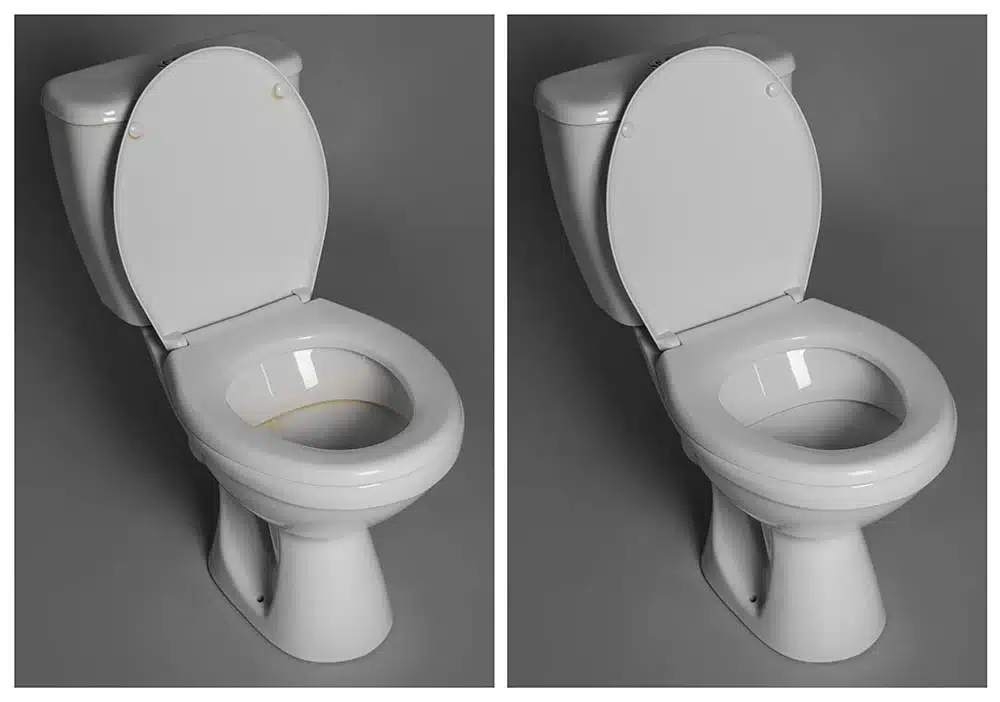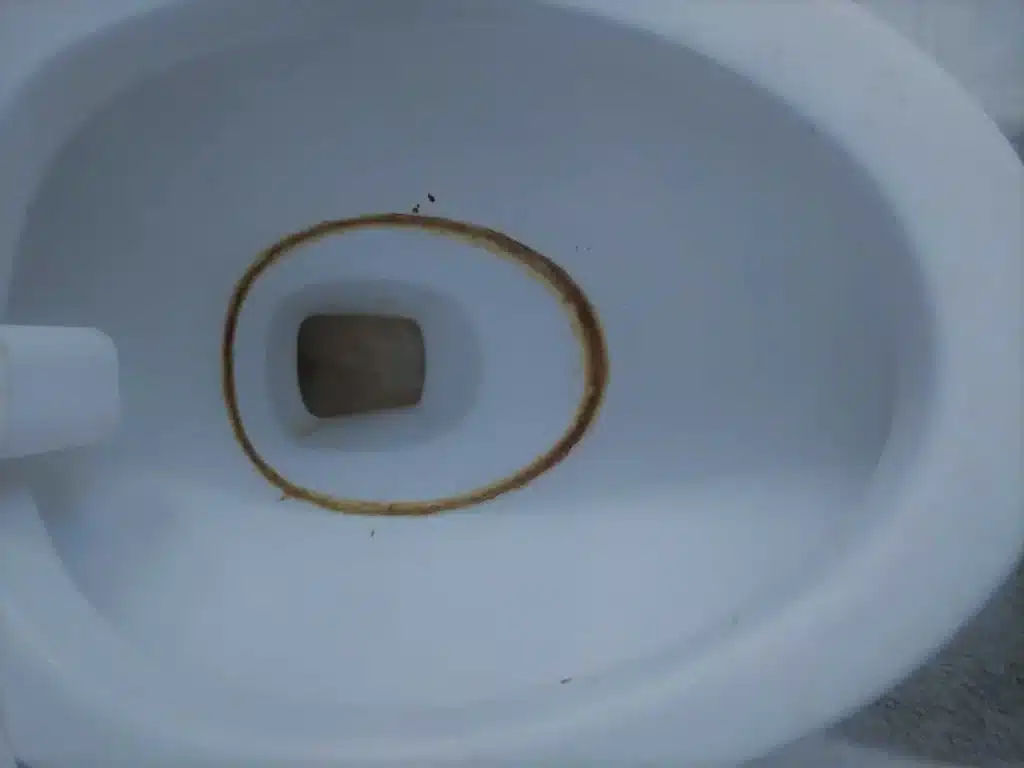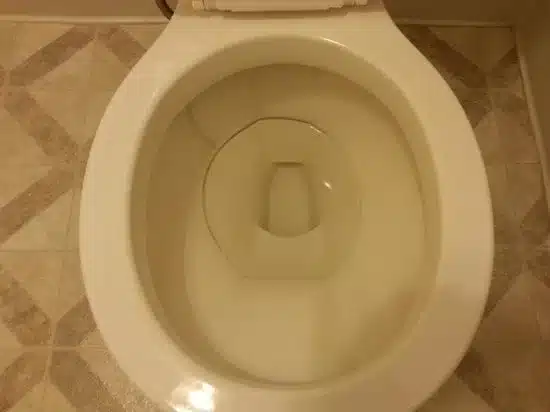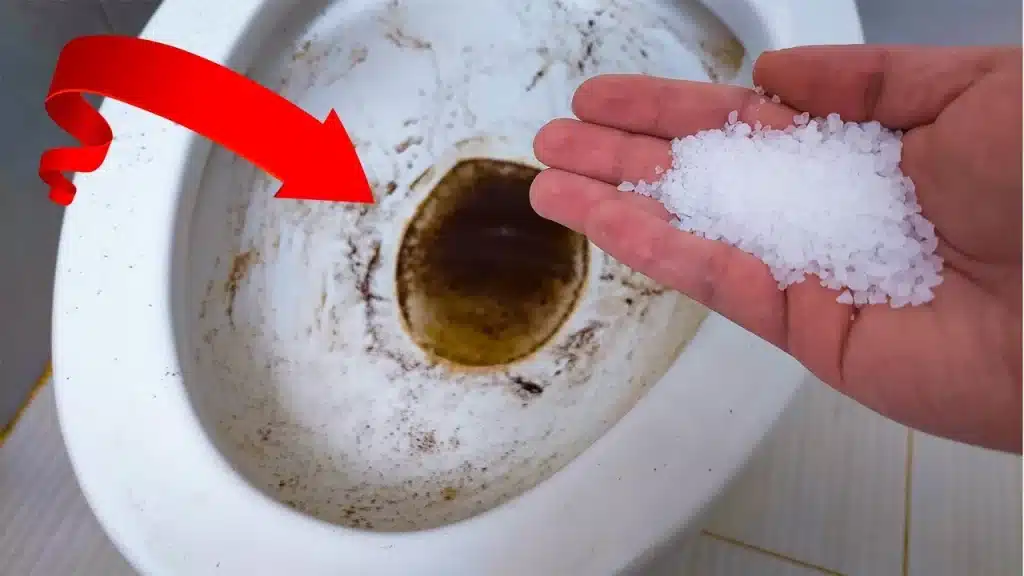A black toilet ring is typically caused by mold, mildew, or mineral deposits. Regular cleaning and maintenance can prevent this unsightly issue.
Toilets are essential fixtures in every home, and their cleanliness speaks volumes about a household’s hygiene standards. A black ring in the toilet bowl not only looks unpleasant but can also signify underlying issues such as persistent bacterial growth or hard water problems.
Keeping your bathroom fresh and clean is important for both health and aesthetic reasons. Combatting the toilet ring requires consistent effort and the right cleaning techniques. With a bit of know-how and regular attention, you can ensure that your toilet remains free of these stubborn stains. Understanding the causes and solutions for a black toilet ring will help in maintaining a spotless and hygienic bathroom environment.

The Stubborn Foe
Picture this: a pristine bathroom with shiny fixtures, but one sight sours the scene—a black toilet ring. The notorious black toilet ring stands as a formidable enemy in the battle for a clean bathroom. Let’s expose the hidden truths about this unwelcome visitor and reveal some tips to banish it for good.
What Lies Beneath The Black Ring
Understanding the nature of the black toilet ring is vital in combating it.
The enemy hides in plain sight: at the waterline or below. It signals stagnant water and potential health hazards. Think bacteria, mold, and mildew, all thriving in moisture. These culprits claim territory in your commode, creating an unsightly ring that defies regular cleaning products.
Common Causes Of Toilet Ring Formation
Several factors contribute to the formation of the black toilet ring. We’ll dive into the most prevalent.
- Hard Water: Minerals in the water build up over time.
- Infrequent Cleaning: It allows grime to get a foothold.
- Poor Ventilation: Moist environments support mold growth.
- Damaged Toilet Surfaces: Rough spots harbor dirt and bacteria.
These common foes can be addressed with strategic care and regular maintenance. A clean toilet is a happy toilet, so let’s look at how to maintain a ring-free bowl.

Health And Hygiene Impacts
Unsightly black rings in toilets do more than tarnish a bathroom’s appearance. They can affect your health. Understand why these rings form and their impact on well-being.
Bacteria And Mold: The Hidden Harm
Bacteria and mold thrive in moist environments. The black ring in a toilet is a prime habitat. It hosts a range of harmful organisms.
- E. coli: A common bacterium in toilet bowls.
- Staphylococcus: This can lead to skin infections.
- Fungi: This may cause allergic reactions and respiratory issues.
Regular cleaning breaks this cycle. It keeps these unwelcome guests away from your bathroom.
Implications For Bathroom Cleanliness
A bathroom with a black toilet ring fails in cleanliness standards. This can signify broader hygienic issues.
| Area | Impact |
|---|---|
| Surface | Marks are breeding grounds for germs. |
| Air quality | Mold spores affect air and health. |
| Toilet items | Brushes and holders get contaminated. |
Clean regularly with appropriate agents. This maintains hygiene and safety in your home.
Tried-and-true Removal Methods
A black toilet ring can be unsightly and embarrassing. Fear not! Menacing as they look, these rings are beatable. It’s time to roll up your sleeves, arm yourself with knowledge, and banish those stubborn stains. Follow these tried-and-true removal methods to restore the toilet’s sparkle.
Natural Cleaning Solutions
Nature offers potent weapons against toilet rings without harming the environment. Here’s how to use them:
- Baking Soda and Vinegar: Unleash the fizzing power by sprinkling baking soda into the bowl, followed by vinegar. Scrub post-fizz for a pristine finish.
- Borax Paste: Apply a thick mixture of Borax powder and water. Let sit before scrubbing to bid adieu to the ring.
- Hydrogen Peroxide: Pour, wait, and scrub. It’s that simple to refresh your throne.
Chemical Cleaners: Pros And Cons
Chemical cleaners promise quick results, but they come with a price. Let’s weigh them up:
| Pros | Cons |
|---|---|
| Powerful against tough stains | Can be harsh on the environment |
| Fast-acting | Potential health risks from fumes |
| Easy to use | May damage septic systems over time |
Preventive Measures
Combat stubborn black rings in your toilet with proactive cleaning habits and regular maintenance. Keep your bathroom’s centerpiece spotless using safe, effective solutions to avoid unsightly, bacteria-breeding stains.
H2preventive Measures/h2
A clean and stain-free toilet is essential for a healthy bathroom. Black toilet rings can seem stubborn. But, taking the right preventive steps can keep them away. Maintenance is key. With simple, regular actions, you can prevent those unsightly rings from ever appearing.
Regular Cleaning Routines
The fight against black toilet rings begins with consistent cleaning. Start with weekly scrubbing. This will stop stains from setting in. Use a stiff-bristled toilet brush. A good toilet cleaner is important too. Look for cleaners with hydrochloric acid or natural alternatives like baking soda and vinegar. They break down the gunk.
Don’t forget about the flush! Each flush can slow down stain buildup. Make sure every family member flushes after use. For deeper cleans, schedule monthly sessions. Use heavy-duty cleaners. Leave them to soak overnight. Scrub thoroughly the next day. Then flush away all residue.
Long-term Protection Against Rings
Water quality affects toilet bowl ring formation. Hard water, with high mineral content, can speed up ring buildup. Combat this with a water softener. It will reduce mineral deposits in the water.
Consider pumice stones for non-toxic cleaning. But, be gentle to avoid scratches. Preventive tablets can also help. Drop one in the tank. It will release cleaning agents with each flush.
- Install a water filter to tackle hard water.
- Use cleaning tablets or bleach in the tank for continuous cleaning.
- Check for leaks regularly. Leaks can cause standing water, leading to more rings.
With these steps, your bathroom stays spotless, ring-free, and welcoming.
Professional Help: When To Call In The Experts
A black toilet ring is not just unsightly but could indicate underlying issues. Sometimes, despite your best efforts,
the stubborn stain persists, and ordinary cleaning hacks fail to work. That’s when you know it’s time to call in the experts. Professional cleaning can address tricky problems, from hard water stains to mold growth that homemaking solutions can’t tackle. Let’s look at some signs signaling the need for professional cleaning and what to expect once the experts take over.
Signs You Need A Professional Cleaning
- Persistent stains that don’t go away after regular cleaning.
- Unpleasant odors that linger even after a thorough scrubbing.
- Visible mold or mildew, which can pose health risks.
- Recurring issues despite using various cleaning products.
- Stains return quickly after cleaning.
What To Expect From Professional Services
Opting for professional help brings a higher level of cleanliness and sanitization. Specialist cleaners come equipped with powerful tools and advanced cleaning solutions designed for tough stains and harmful microbes. Here’s a breakdown of their service process:
- Experts will assess the toilet and surrounding area to pinpoint issues.
- A customized cleaning plan is created, focusing on eliminating the black ring.
- High-grade cleaning agents and techniques are used to erase stains and sanitize.
- Additional advice is provided to prevent future toilet ring formation.
- Safe practices ensure the longevity of your toilet’s finish.
Professionals guarantee a level of cleanliness that DIY methods can’t achieve. Say goodbye to the hassle and hello to a sparkling, hygienic bathroom.

Frequently Asked Questions Of Black Toilet Ring
What Causes A Black Ring In My Toilet Bowl?
A black ring in your toilet bowl can result from mold growth or mineral deposits from hard water. Regular cleaning and using water softeners can prevent this issue.
How Do I Get Rid Of The Black Ring Under My Toilet Rim?
To remove the black ring under your toilet rim, pour 1 cup of white vinegar into the bowl. Let it sit for 1 hour, then scrub it with a toilet brush. Flush to rinse away the residue. Repeat if necessary for tough stains.
What Is The Black Mold Ring In My Toilet Bowl?
The black mold ring in your toilet bowl is a common fungus growth caused by lingering moisture and organic matter. Regular cleaning can prevent its formation.
What Causes Black Ring In Toilet Bowl Diabetes?
High sugar levels in urine can lead to black rings in toilet bowls for people with diabetes, as sugar fosters bacterial growth. Regular cleaning reduces this issue.
Conclusion
Addressing a black toilet ring promptly is essential for maintaining hygiene and aesthetics in your bathroom. Armed with the right techniques and cleaners, banishing stubborn stains becomes straightforward. Remember, regular cleaning can prevent these unsightly rings from reappearing. Keep your throne spotless and welcoming with consistent care.

